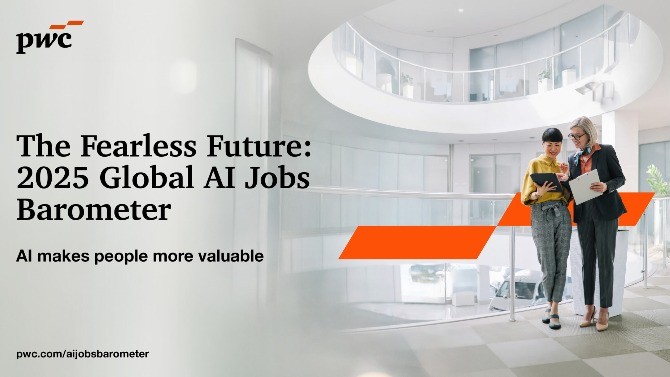PwC Global AI Jobs Barometer 2025 Reveals AI Impact on Productivity and Wages

Artificial Intelligence (AI) is significantly enhancing worker value, productivity, and earning potential, with job numbers increasing even in roles traditionally considered susceptible to automation. These findings emerge from PwC's 2025 Global AI Jobs Barometer, an extensive analysis of nearly a billion job advertisements across six continents, including company financial reports, with data through the end of 2024.
The proliferation of Generative AI since 2022 has been linked to a near quadrupling of productivity growth in industries most exposed to AI, such as financial services and software publishing. Productivity in these sectors rose from 7% between 2018-2022 to 27% for the period 2018-2024. In stark contrast, industries least exposed to AI, like mining and hospitality, experienced a decline in productivity growth from 10% to 9% over the same period. Furthermore, 2024 data indicates that the most AI-exposed industries are achieving three times higher growth in revenue per employee (27%) compared to the least exposed industries (9%). Carol Stubbings, Global Chief Commercial Officer at PwC, commented, "This research shows that the power of AI to deliver for businesses is already being realised. And we are only at the start of the transition. As we roll out Agentic AI at enterprise scale, we are seeing that the right combination of technology and culture can create dramatic new opportunities to reimagine how organisations work and create value."
Contrary to widespread concerns about AI-driven job destruction, the report indicates a resilient and growing job market. While occupations with lower exposure to AI saw substantial job growth of 65% between 2019 and 2024, growth remained robust at 38% even in more AI-exposed occupations. Within these more exposed roles, which can be classified as 'automated' (where AI performs tasks) or 'augmented' (where AI assists humans), job numbers are increasing across all analyzed industries. Augmented jobs are generally observed to be growing at a faster rate. Joe Atkinson, Global Chief AI Officer at PwC, stated, "In contrast to worries that AI could cause sharp reductions in the number of jobs available – this year's findings show jobs are growing in virtually every type of AI-exposed occupation, including highly automatable ones. AI is amplifying and democratizing expertise, enabling employees to multiply their impact and focus on higher-level responsibilities."
Wage growth is also accelerating in AI-exposed sectors, with wages rising twice as fast compared to less exposed industries. Notably, jobs requiring AI-specific skills now command an average wage premium of 56% in 2024, a significant increase from 25% in the previous year. The demand for such AI skills continues to surge, with these job postings growing by 7.5% from the last year, even as total job postings experienced an 11.3% decline.
The rapid advancement of AI is causing a "skills earthquake," fundamentally altering the skills workers need. The report reveals that the skills sought by employers are changing 66% faster in occupations most exposed to AI, a sharp rise from 25% last year. This evolving landscape also shows a declining employer demand for formal degrees, particularly in AI-exposed jobs. Between 2019 and 2024, the percentage of AI-augmented jobs requiring a degree fell from 66% to 59%, while for AI-automated jobs, it dropped from 53% to 44%. The findings also suggest a potential unequal impact on genders, as more women are in AI-exposed roles across every country analyzed, indicating potentially higher skills pressure for women. Pete Brown, Global Workforce Leader at PwC, emphasized, "AI’s rapid advance is not just re-shaping industries, but fundamentally altering the workforce and the skills required. This is not a situation that employers can easily buy their way out of. Even if they can pay the premium required to attract talent with AI skills, those skills can quickly become out of date without investment in the systems to help the workforce learn."
To navigate this transformative period and harness AI's potential, the PwC report recommends five key actions for businesses:
1. Use AI for enterprise-wide transformation: Integrate AI across all business functions as a comprehensive strategy, rather than isolated initiatives.
2. Treat AI as a growth strategy: Focus on leveraging AI for new revenue streams and market expansion, not solely for efficiency gains.
3. Prioritise Agentic AI: Invest in and deploy advanced AI agents capable of autonomous or semi-autonomous actions to unlock new levels of productivity and innovation.
4. Enable your workforce with AI skills: Implement robust training and development programs to equip employees with the necessary skills to utilize AI effectively.
5. Unlock AI’s transformative potential by building trust: Address ethical considerations, ensure transparency in AI use, and foster a culture of trust to encourage adoption and maximize AI's benefits.
The Barometer defines 'more exposed' jobs as the top 50% of jobs with greater AI exposure, 'less exposed' jobs as the bottom 50%, and 'most exposed' jobs as the top 25%. It utilizes the IMF's methodology to distinguish between AI-exposed jobs that are highly 'automatable' (many tasks AI can perform) versus those that are highly 'augmentable' (AI supports human expertise).












